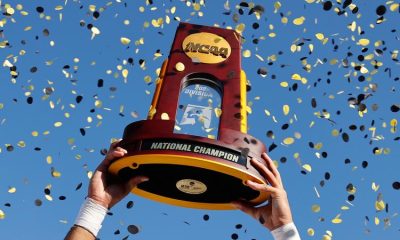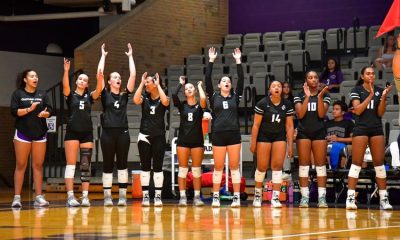E-Sports
Longmont to launch “LevelUp Longmont” esports event this fall
Gamers of all ages are invited to compete in Longmont’s first esports event on Sept. 27, “LevelUp Longmont,” from 11 a.m. to 6:30 p.m. across three neighboring venues. LevelUp Longmont is designed to be “part festival, part tournament,” according to a news release, and will feature food, music, and fun. Players will battle their way […]

Gamers of all ages are invited to compete in Longmont’s first esports event on Sept. 27, “LevelUp Longmont,” from 11 a.m. to 6:30 p.m. across three neighboring venues.
LevelUp Longmont is designed to be “part festival, part tournament,” according to a news release, and will feature food, music, and fun. Players will battle their way through the library’s outdoor patio and meeting rooms (409 Fourth Ave.), Longmont Public Media (457 Fourth Ave.), and the Civic Center breezeway and City Council Chambers (350 Kimbark St.)
Qualifying matches will be hosted by the Longmont Public Library on July 22 and Aug. 25. The featured game in this year’s tournament (and qualifier) is Brawlhalla. It’s free to play and supports up to eight players online or locally. There are two age divisions in the competition: 13 and under (13U) and absolute/all ages (ABS). Players who win first, second or third place in the first qualifier can automatically advance to the tournament. If a player does not place in the first qualifier, they can try again at the Aug. 25 qualifier.
Registration for the first round of qualifiers is open now. Visit bit.ly/LevelUpLongmont for more information.
E-Sports
Learning in high-speed mode – How eSports trains mental agility
Split-second decisions, strategic thinking, lightning-fast action: What is commonplace in digital gaming worlds is increasingly revealing itself as a catalyst for peak cognitive performance. eSports, long derided as mere leisure activity, is establishing itself in research as a training ground for mental agility – with relevance far beyond gaming. Anyone who wants to succeed in […]

Split-second decisions, strategic thinking, lightning-fast action: What is commonplace in digital gaming worlds is increasingly revealing itself as a catalyst for peak cognitive performance. eSports, long derided as mere leisure activity, is establishing itself in research as a training ground for mental agility – with relevance far beyond gaming. Anyone who wants to succeed in virtual arenas must not only have sharp reflexes, but also be stress-resistant, able to multitask, and willing to learn.
Mental muscle training in the digital space
Scientific studies show that regular eGaming improves reaction time, visual perception, and cognitive flexibility. Real-time games like League of Legends or Counter-Strike, in particular, challenge players to make split-second decisions, analyze complex situations, and continuously adapt to changing conditions. These skills can not only be measured but also transferred to real-world scenarios, such as extreme sports, traffic, or high-stress jobs.
A particularly insightful finding comes from the University of Rochester: In experiments, gamers responded up to 20 percent faster to visual and auditory stimuli than non-gamers. More important than the game content is the speed of information processing. This makes the brain not only faster but also more efficient.
High-speed decisions and strategic thinking
Mental agility encompasses more than just quick reflexes. It refers to the ability to flexibly switch between tasks, revise action plans on the fly, and simultaneously keep an eye on the overall strategy. In competitive eSports titles, this is a basic requirement: For example, someone who issues several commands per minute in StarCraft II must not only skillfully allocate their cognitive resources, but also filter out distractions and dynamically set priorities. This demands executive functions of the highest order, comparable to the demands of air traffic control or stock trading.
Digital systems that map such performance are increasingly playing a role in the iGaming sector, especially when it comes to gaming environments that require responsive behavior, analytical thinking, and mental resilience under real-time conditions. Technologies specifically suited to eSports offer measurable added value here: They not only enable more precise game analysis but also set new standards for user guidance, fairness mechanisms, and cognitive interaction.
Emotional self-regulation is also trained in eSports. Pressure, defeat, and unpredictability are part of the everyday life of professional gamers. Dealing with frustration, quickly recovering from mistakes, and developing long-term resilience strategies foster a mental toolbox that is just as in demand in academic or professional contexts as it is in dynamic, game-like application scenarios within the iGaming world.
Virtual training for real skills
Young athletes, especially those involved in extreme sports, are now turning to eGaming as a supplement to their physical training. The combination of traditional movement drills and digital reflex training is showing initial success: snowboarders, freeskiers, and parkour skiers are reporting increased reaction speed, improved spatial orientation, and mental clarity in critical situations.
They benefit from games like Counter-Strike or Apex Legends, which simultaneously require movement, strategy, and team coordination. VR platforms are now also experimenting with immersive training scenarios in which balance, depth perception, and timing are tested in three-dimensional space, for example, in preparation for base jumps or mountain bike descents.
Pedagogy and potential: eSports in an educational context
Another exciting area of application is school and academic education. Here, eSports is increasingly being used as a vehicle to promote learning motivation, teamwork, and analytical thinking. US universities already offer eSports scholarships; gaming is part of the curriculum in South Korea; and German schools are also beginning to incorporate digital competitive games into project weeks and after-school programs.
The learning effect lies not only in the game itself, but also in the surroundings: strategy planning, error analysis, communication, and goal pursuit are essential components of a successful eSports career. Learning psychologists are already speaking of a “playful culture of excellence” in which young people develop self-efficacy and perseverance through digital challenges.
As promising as the positive effects are, eSports is no substitute for physical training. Even though cognitive abilities are intensively trained, endurance, muscle strength, and fine-tuning of motor skills remain unaffected in the purely virtual space. Furthermore, excessive gaming without physical exercise can lead to concentration problems, poor posture, or social isolation.
Balance is therefore crucial. As with any competitive sport, a structured training environment, professional support, and clear recovery phases are required. Initial initiatives to integrate exercise games, targeted ergonomics advice, and mental coaching into eSports teams are providing important impetus in this regard.
Between pixels and potential
eSports is far more than a digital spectacle; it’s a playground for high-performance mental performance. Those who excel in virtual competitions are practicing skills that are becoming increasingly important in an increasingly interconnected, fast-paced, and complex world. Learning in high-speed mode means not only reacting faster, but also acting more intelligently.
Viewing eSports as a serious learning field opens up new perspectives for education, sports, and professional development. Instead of dismissing gaming as a waste of time, it’s worth taking a more nuanced look at its structures, dynamics, and learning effects, as a guide to a future in which digital skills and mental agility become the foundation of personal and societal resilience.
E-Sports
Pa. kids can level up in cutting-edge Esports lab in West Chester
WEST CHESTER, Pennsylvania (WPVI) — Kids can level up their skills in the virtual world and beyond thanks to Metro Esports labs spawning at local YMCAs. For example, the Oscar Lasko YMCA in West Chester recently launched their gaming lab. The room is fit with neon lights, multiple gaming PCs, and various PS5, Xbox, and […]

WEST CHESTER, Pennsylvania (WPVI) — Kids can level up their skills in the virtual world and beyond thanks to Metro Esports labs spawning at local YMCAs.
For example, the Oscar Lasko YMCA in West Chester recently launched their gaming lab. The room is fit with neon lights, multiple gaming PCs, and various PS5, Xbox, and Nintendo Switch systems. They collaborated with a company, Metro Esports, which specializes in creating spaces such as this.
They host camps to teach kids about teamwork, science, technology, and more. They also offer free play hours.
The gaming systems are outfitted with a software called Kidas ProtectMe, which monitors voice and text chats to help protect kids from inappropriate content, scams, and cyberbullying.
Watch the video above to see the gaming lab in action.
To learn more about programs at the Oscar Lasko YMCA, including the Metro Esports lab, visit their website.
RELATED: Students build career paths in the trades before graduating high school
Two students who dream of building a better future have gotten a head start in the construction industry before even getting a high school diploma.
Copyright © 2025 WPVI-TV. All Rights Reserved.
E-Sports
How Hasbro Casino Gaming Is Monetizing Nostalgia For A New Generation Of Players
The rise of Hasbro Casino Gaming marks a turning point in how we think about nostalgia, entertainment, and monetization. Article By Stephen Crystal – Founder & CEO, SCCG – SCHEDULE A MEETING In a move that underscores just how far the gaming industry has evolved, Hasbro has unveiled a powerful new slate of partnerships aimed at reimagining […]


The rise of Hasbro Casino Gaming marks a turning point in how we think about nostalgia, entertainment, and monetization.
Article By Stephen Crystal – Founder & CEO, SCCG – SCHEDULE A MEETING
In a move that underscores just how far the gaming industry has evolved, Hasbro has unveiled a powerful new slate of partnerships aimed at reimagining its most iconic brands for a very different kind of audience—adult casino players. This shift isn’t just about brand expansion; it’s a strategic push into a rapidly growing sector that’s redefining how intellectual property can live across generations.
The Emotional Engine Behind Hasbro Casino Gaming
The emotional draw of nostalgia has become a force in entertainment, and Hasbro knows this well. Their games—Monopoly, Yahtzee, Battleship—aren’t just products. They’re cultural artifacts, embedded in family game nights, sleepovers, and holiday traditions. Tapping into that emotional familiarity allows Hasbro to bridge the gap between childhood memories and adult entertainment.
But this isn’t just a feel-good story. The strategy behind Hasbro Casino Gaming is anchored in monetizing sentiment. As millennials and Gen Xers become a larger share of casino customers—particularly in the online and hybrid formats—they’re looking for more than just flashing lights and spinning reels. They want meaning, storytelling, and familiarity. Hasbro’s brands offer just that, in a format that now extends from the tabletop to the casino floor.
From Toy Shelf to Casino Screen
What makes this move more than a gimmick is the scale and seriousness of Hasbro’s approach. With strategic partnerships across all corners of the gambling ecosystem—Aristocrat Technologies for land-based slots, Evolution for online and live casino games, Galaxy Gaming for table games, and Bally’s for online casino operations—the company is not simply licensing its IP; it’s integrating into the infrastructure of modern gaming.
Hasbro Casino Gaming is not limited to a single product line or one-off experiences. It’s a coordinated multi-format strategy that includes exclusive slot machines, live dealer games, and casino tables rebranded with globally recognized Hasbro properties. This approach allows the brand to be present in every format that adult players now engage with—online, on-premise, and everything in between.
The Bigger Picture: Nostalgia as a Competitive Advantage
Hasbro’s decision reflects a broader shift within gaming and entertainment. Much like how LEGO has released adult-themed building sets or how Nintendo has brought back Mario Kart in immersive arcade formats, companies are recognizing the commercial power of aging fan bases. What once served children now serves adults—without losing the emotional hook of the original product.
This concept isn’t new, but the scale of Hasbro Casino Gaming shows a higher level of commitment. By tapping into the emotional loyalty that spans decades, Hasbro is competing not just on novelty, but on memory. In a casino market flooded with generic slot themes and table variations, these brands carry an instant recognition factor that few competitors can replicate.
Navigating the Line Between Entertainment and Risk
There’s also an underlying complexity worth noting. When beloved childhood brands enter the world of regulated gambling, there’s an inherent tension between lighthearted fun and the risks associated with wagering. Hasbro appears to be navigating this thoughtfully, licensing its brands only to highly credible, regulated operators and developers who understand the nuances of adult entertainment.
By working with trusted partners like Aristocrat, Evolution, and Bally’s, the brand maintains control over how its IP is adapted. The focus remains on crafting immersive, compliant, and engaging experiences that add value to the player journey—without diluting the integrity of the original brands.
What This Means for the Future of Casino IP
The rise of Hasbro Casino Gaming signals a new phase for the broader industry. As brand recognition and emotional storytelling become differentiators in both online and land-based formats, we can expect to see more household names following Hasbro’s lead. The convergence of mainstream IP and real-money gaming is no longer just a marketing experiment—it’s becoming an essential pillar of growth.
Operators, game developers, and licensing agencies would be wise to study this model. It proves that innovation in casino gaming doesn’t have to come solely from new game mechanics or emerging technologies—it can come from reimagining the familiar in formats that resonate with today’s adult players.
Hasbro has always been about play. Now, through strategic execution and an understanding of its evolving audience, it’s turning that play into serious business—while giving the industry a blueprint for how to win with emotion, memory, and smart partnerships.

E-Sports
iQOO appoints 25-year-old as Chief Gaming Officer (CGO); Offers INR 10 Lakh
India, August 1, 2025: iQOO, the high-performance smartphone brand, appoints Vedang Vikas Chavan, a 25-year-old eSports coach and gamer from Mumbai, has been named as iQOO’s new Chief Gaming Officer, emerging victorious in a three-month-long search that drew over 80,000 participants from 400+ Indian cities and towns. Vedang has been tested on his gameplay skills, […]

India, August 1, 2025: iQOO, the high-performance smartphone brand, appoints Vedang Vikas Chavan, a 25-year-old eSports coach and gamer from Mumbai, has been named as iQOO’s new Chief Gaming Officer, emerging victorious in a three-month-long search that drew over 80,000 participants from 400+ Indian cities and towns. Vedang has been tested on his gameplay skills, gaming knowledge, personality, and communication along with the other participants. As part of this role, he will take home a remuneration of INR 10 Lakh.
Hailing from Navi Mumbai, Vedang’s journey is a story of relentless passion and perseverance. A chess prodigy in his early years, Vedang discovered gaming at age 10 and soon found himself captivated by esports. From sneaking into gaming cafés during college to representing India at international PUBG PC tournaments in Japan, Malaysia, Singapore, the Philippines, and Australia, his hustle never stopped. When he transitioned to coaching, he set out to give aspiring gamers a real shot at experiencing competitive esports. He handpicked grassroots talent and built teams from scratch, coaching them to podium finishes at top esports events. From being told he wasn’t good enough to become a sought-after leader, Vedang carved his space in a tough industry and helped others rise alongside him.
Expressing his excitement, Vedang said, “I’m genuinely overwhelmed and grateful to be named iQOO’s new Chief Gaming Officer. When I first came across this opportunity on LinkedIn, I saw it as the perfect way to challenge myself, a chance to grow, upgrade my skills, and do something meaningful in the esports space. And the fact that it was coming from a brand like iQOO made it even more exciting. I knew I had to give it my all. I never imagined it would take me all the way here. The competition rounds were intense, and the finalists I met along the way were all incredibly talented. I’ll never forget the video call with Nipun sir congratulating me, that’s a moment I’ll always treasure. This journey has been surreal, and I’m thankful to iQOO, the jury, and everyone who believed in me. I’m excited to now take this passion forward with iQOO and give back to the community that shaped me.
Welcoming Vedang, Nipun Marya, CEO, iQOO, said, “This is yet another iconic moment for the Indian smartphone industry, and we are proud to welcome Vedang as our new Chief Gaming Officer. Vedang perfectly embodies the spirit of ‘I Quest On and On’. His journey from grassroots gaming to leading top teams reflects the passion and perseverance we value at iQOO. With his experience as a player, coach, and mentor, we believe he will bring a sharper understanding of the gaming community and a fresh perspective to our gaming initiatives. All of us at iQOO are excited to have him join the family, and we are confident he will make a meaningful impact in this role.”
From competing against 80,000+ passionate gamers to impressing a power-packed jury panel featuring Nipun Marya, Rannvijay Singha, Payal Gaming (Payal Dhare), and 8bit Thug (Animesh Agarwal), Vedang has emerged as the winner of CGO 2.0. As CGO, Vedang will work closely with iQOO’s leadership, offering insights to enhance the smartphone gaming experience and connect with the esports ecosystem. The position will also give him the opportunity to collaborate with top gamers across India and earn a prize of INR 10 Lakhs.
In addition to strengthening its presence in the esports space, iQOO has appointed Harshvardhan as its official caster. A passionate storyteller and presenter, Harshvardhan began his casting journey two years ago and quickly made a mark by winning the Nodwin Gaming Talent Hunt three times, including during BGIS 2024. Beyond the mic, he brings a well-rounded understanding of the esports ecosystem, skilled in production, match analysis, editing, and design. With his deep connection to the gaming community and evolving expertise, Harshvardhan will serve as a strong voice for iQOO’s gaming initiatives across platforms.
The 2.0 edition of iQOO’s Chief Gaming Officer hunt stands as a powerful testament to the brand’s commitment to India’s growing gaming ecosystem. After a successful debut in 2023 with CGO 1.0, which saw Shwetank Pandey take the title, CGO 2.0 returned with even greater energy, drawing over 80,000 entries from 400+ cities and towns across the country. More than just a talent hunt, the initiative reflects iQOO’s larger vision of empowering young gamers, celebrating gaming as a serious pursuit, and driving innovation to deliver high-performance smartphone experiences for the community.
E-Sports
North of the River Recreation offers fall fitness and esports events
BAKERSFIELD, Calif. (KBAK/KBFX) — As fall approaches, the North of the River Recreation and Park District is gearing up with a variety of events for the community. Starting Monday, August 11, the district will host a TotalFit Circuit, running through Friday, September 15. This program is designed to accommodate all fitness levels, offering workouts aimed […]

BAKERSFIELD, Calif. (KBAK/KBFX) — As fall approaches, the North of the River Recreation and Park District is gearing up with a variety of events for the community.
Starting Monday, August 11, the district will host a TotalFit Circuit, running through Friday, September 15. This program is designed to accommodate all fitness levels, offering workouts aimed at helping participants get stronger, feel better, and have fun. The cost to join the TotalFit Circuit is $69.
In addition to fitness, the district is also offering an esports opportunity with a Super Smash Bros. Ultimate league on Saturdays. This six-week league will feature different age ranges for competition, with a registration fee of $150.
For younger participants, ages 3 to 6, there is a separate Super Smash Bros. Ultimate program available for $69. This is part of NOR’s discovery sports program, which focuses on providing the building blocks for learning basic sports skills.
For more information, click here.
E-Sports
How tariffs have upended the back-to-school season
This year, one of the most important annual shopping events hangs in the balance of how shoppers respond to the threat of tariffs with their wallets, with President Trump’s deadline for trade deals set for Aug. 1. Shoppers are spreading out their back-to-school shopping over the course of the summer and are more concerned about finding the […]

This year, one of the most important annual shopping events hangs in the balance of how shoppers respond to the threat of tariffs with their wallets, with President Trump’s deadline for trade deals set for Aug. 1.
Shoppers are spreading out their back-to-school shopping over the course of the summer and are more concerned about finding the best deal than they were a year ago, according to recent consumer surveys. Retailers have had to change how they market and plan back-to-school events — highlighting when they are keeping prices the same. They have also especially put emphasis on sales events in mid-July as consumers signal they’re willing to shop earlier to get the best deals.
“Consumers, overall, are very cost-conscious at the moment,” said Stephanie Cegielski, vp of research for shopping center industry group ICSC. “We’re still seeing them spend, we still see year-over-year growth in retail sales, but they’re cautious about where they’re spending, they’re going to the discount stores, and they’re just being a little bit more mindful about what they’re spending on.”
In one survey from ICSC conducted July 7-9, 55% of respondents said they had already completed their back-to-school shopping, a seven percentage-point increase from a year ago. Forty-six percent of respondents said they plan their shopping around specific promotional events like Target Circle Week, Amazon Prime Day, Walmart Deals or Labor Day sales, with nine in 10 respondents saying promotions generally influence their purchases during the back-to-school season.
“I think they’re planning their budgets around [these sales events],” Cegielski said. “Ten, 20 years ago, it was this event that you went to a couple of weeks before [school starts], you got all your school supplies, and you were done. Consumers now are really looking for the best deals that they can find.”
Ninety-one percent of back-to-school shoppers said higher prices would impact their purchasing behaviors this season, driving them to buy items on sale, buy from cheaper brands, compare prices across retailers or reuse supplies they already have, per the ICSC survey.
A separate survey from Deloitte conducted in May projected that shoppers would spend $570 per child, on average, during the back-to-school season.
“It just shows you how savvy these consumers have gotten about looking for deals — and they have this budget in their head that they’re not really moving off of,” said Lupine Skelly, retail research leader for Deloitte, adding that the average budget is down for the fifth year in a row.
Deloitte also found an increase in August spending and that less back-to-school spending was planned to be done by the end of July — 61% this year versus 66% last year. About half of parents said they were anxious about the potential for higher prices on back-to-school items, and half also said they planned to cut back in other areas to budget for back-to-school.
As customers embraced earlier shopping this year, retailers leaned into events coinciding with Amazon Prime Day in July. As Amazon extended Prime Day this year, and retailers hosting competing events followed suit. Walmart’s deals event ran more than a day longer than it did last year. Best Buy extended its summer sales event from three to seven days from 2024 to 2025.
“Retailers are pretty aware of this value-seeking consumer,” Skelly said. “They’ve trained the consumer to jump early and get into those types of promotional events.”
Meanwhile, ICSC’s Cegielski said she has heard from retailers that they are trying to keep prices low on key items by raising the price on other items to shift the higher costs from tariffs. For example, Cegielski said a retailer may have a T-shirt selling well at $5 and raise the price of something else to keep that successful price intact.
“They’re really trying to … not have to pass those costs along to the consumer on those essential items,” Cegielski said. “Will that hold true everywhere? Unfortunately not. But for things like this, I think retailers are really trying to provide the best prices to consumers where they can.”
-

 Fashion3 weeks ago
Fashion3 weeks agoEA Sports College Football 26 review – They got us in the first half, not gonna lie
-

 Health3 weeks ago
Health3 weeks agoCAREGD Trademark Hits the Streets for Mental Health Month
-

 Sports3 weeks ago
Sports3 weeks agoNew NCAA historical database provides wealth of information on championships
-

 Sports2 weeks ago
Sports2 weeks agoVolleyball Releases 2025 Schedule – Niagara University Athletics
-

 Sports2 weeks ago
Sports2 weeks agoAdapti, Inc. (OTC
-

 College Sports3 weeks ago
College Sports3 weeks agoBuford DB Tyriq Green Commits to Georgia
-

 High School Sports1 week ago
High School Sports1 week ago100 days to men's college basketball
-

 Rec Sports2 weeks ago
Rec Sports2 weeks agoFlorida woman, 20, accused of pepper-spraying rich men in Miami Beach hotels, stealing their luxury watches
-

 Health2 weeks ago
Health2 weeks agoJoliet West alum's basketball clinic focuses on mental health as well as physical performance
-

 Youtube3 weeks ago
Youtube3 weeks agoHawaii TOP SPORTS MOMENTS! 🏈⚾ | SportsCenter





























